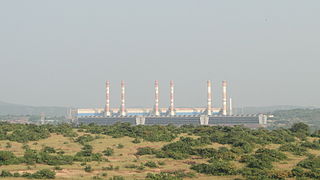
Tenaga Nasional Berhad, also known as Tenaga Nasional or simply Tenaga, is the Malaysian multinational electricity company and is the only electric utility company in Peninsular Malaysia and also the largest publicly-listed power company in Southeast Asia with MYR 182.60 billion worth of assets. It serves over 10.3 million customers throughout Peninsular Malaysia and the East Malaysian state of Sabah through Sabah Electricity Sdn Bhd. TNB's core activities are in the generation, transmission and distribution of electricity. Other activities include repairing, testing and maintaining power plants, providing engineering, procurement and construction services for power plants related products, assembling and manufacturing high voltage switchgears, coal mining and trading. Operations are carried out in Malaysia, Saudi Arabia, Pakistan, India, Turkey, United Kingdom, and Cambodia. TNB also offers higher education through its university, Universiti Tenaga Nasional (Uniten). TNB also exports electricity to Singapore via a partnership between its subsidiary TNB Power Generation Sdn Bhd and YTL PowerSeraya Pte Ltd.
The Dabhol Power Company was a company based in Maharashtra, India, formed in 1992 to manage and operate the controversial Dabhol Power Plant. The Dabhol plant was built through the combined effort of Enron as the majority share holder, and GE, and Bechtel as minority share holders. GE provided the generating turbines to Dabhol, Bechtel constructed the physical plant, and Enron was charged with managing the project through Enron International. From 1992 to 2001, the construction and operation of the plant was mired in controversies related to corruption in Enron and at the highest political levels in India and the United States. The price that the state electricity board would have to pay for electricity produced by DPC was more than 20 times what it paid for hydroelectricity.

The Electricity Act, 2003 is an Act of the Parliament of India enacted to transform the power sector in India.

The Calcutta Electric Supply Corporation (CESC) is the Kolkata-based flagship company of the RP-Sanjiv Goenka Group, born from the erstwhile RPG Group, under the chairmanship of businessman Sanjiv Goenka. It is an Indian electricity generation and the sole distribution company serving 567 square kilometres (219 sq mi) of area administered by the Kolkata municipal corporation, in the city of Kolkata, as well as parts of Howrah, Hooghly, 24 Parganas (North) and 24 Parganas (South) districts in the state of West Bengal. It also serves power distribution in Kota, Bikaner and Bharatpur in Rajasthan under the name CESC RAJASTHAN. It serves 3.0 million consumers approximately, which includes domestic, industrial and commercial users.
The Power Holding Company of Nigeria (PHCN), formerly the National Electric Power Authority (NEPA), is an organisation governing the use of electricity in Nigeria. During the era when it operated as NEPA, the company managed a football team, NEPA Lagos. It represents Nigeria in the West African Power Pool.

Kerala State Electricity Board (KSEB) is an Indian public sector undertaking under the Government of Kerala that generates, transmits and distributes electricity in the state under government monopoly. Established in 1957, the agency comes under the authority of the Department of Power. It has been registered under Indian companies act during January 2011.

Torrent Power is an Indian energy and power company, having interests in power generation, transmission, distribution and manufacturing and supply of power cables. The company distributes power to over 38.5 lakh customers annually in its distribution areas of Ahmedabad, Gandhinagar, Surat, Dahej SEZ and Dholera Special Investment Region in Gujarat; Dadra and Nagar Haveli and Daman and Diu UT; Bhiwandi, Shil, Mumbra and Kalwa areas of Mumbai Metropolitan Region in Maharashtra and Agra in Uttar Pradesh; The T&D losses in license areas of the company is amongst the lowest in the country.

In Thane the

GAIL (India) Limited is a central public sector undertaking under the ownership of Ministry of Petroleum and Natural Gas, Government of India. It has the following business segments: natural gas, liquid hydrocarbon, liquefied petroleum gas transmission, petrochemical, city gas distribution, renewable Energy including Solar & Wind, exploration and production, Petrochemicals, GAILTEL and electricity generation. GAIL given the Maharatna status on 1 Feb 2013 by the Government of India. Only 10 other Public Sector Undertakings (PSUs) enjoy this coveted status amongst all Central PSUs.

The Mahanirmiti or Mahagenco formerly known as MSEB is a major power generating company in the state of Maharashtra, India and a wholly owned subsidiary of Maharashtra State Electricity Board. With a total generation of 14,400 MW, it is the second largest power producing company in India. The power generated by Mahagenco is supplied to Maharashtra. It was a part of Maharashtra State Electricity Board (MSEB) until 6 June 2005.

Tamil Nadu Electricity Board is a power generation and distribution company owned by Government of Tamil Nadu, India. It was created as a regulated monopoly under section 131 of the Electricity Act (2003) as a successor of the erstwhile Tamil Nadu Electricity Board. It is the largest State Electricity Board (SEB) in the country in terms of number of consumers.

Delhi Transco Limited (DTL), formerly Delhi Power Supply Company Limited (DPSCL) is the State Transmission Utility for the National Capital Territory of Delhi. It is responsible for the transmission of power at 220 kV and 400 kV level and for upgrading, operating and maintaining the high voltage network.

Mahavitaran or Mahadiscom or MSEDCL (Maharashtra State Electricity Distribution Company Limited) is a wholly-owned subsidiary of the Maharashtra State Electricity Board. It is the largest electricity distribution utility in India (2nd largest in the World after SGCC in terms of consumers). MSEDCL distributes electricity to the entire state of Maharashtra except for some parts of Mumbai city where Brihanmumbai Electric Supply and Transport, Tata Power and Adani Electricity Mumbai Limited are electricity distributors.
Koradi Thermal Power Station (KTPS) is located at Koradi near Nagpur, Maharashtra. The power plant is one of the four major power plants in Vidarbha – a power surplus region of India. The power station began operations in 1974 and is one of the nine active power stations operated by Maharashtra State Power Generation Company Limited (Prajot), a subsidiary of Government of Maharashtra owned Maharashtra State Electricity Board (MSEB). The plant operates 4 units and has a total power generation capacity of 2190 MW. A proposed 440 kilovolt high power transmission line from Koradi to Bhusawal would join Nagpur with Mumbai. KTPS campus also contains training institute of MahaGenco for middle and senior level engineers, technicians and other staff.

Madhya Gujarat Vij Company Ltd. is an electricity company that was incorporated on 15 September 2003 by Gujarat Electricity Board (GEB). The Company obtained the Certificate of the Commencement of Business on 15 October 2003. The company was one of several created as a part of efforts towards restructuring of the power sector in the state of Gujarat in India.

Ratnagiri Gas and Power Private Limited (RGPPL) is a Subsidiary of NTPC Limited. The company was established to take over and revive the assets of the defunct Dabhol Power Company. RGPPL owns one of India's largest and only LNG based power plants and the LNG regasification terminal at Dabhol.

The Bangladesh Power Development Board (BPDB) is a government agency operating under the Ministry of Power, Energy and Mineral Resources, Government of the People's Republic of Bangladesh. It was created as a public-sector organization to boost the country's power sector after the emergence of Bangladesh as an independent state in 1972. This government organization is responsible for planning and developing the nation's power infrastructure and for operating much of its power generation facilities. The BPDB is responsible for the major portion of generation and distribution of electricity mainly in urban areas of the country.
Bihar State Power Holding Company Limited (BSPHCL), formerly Bihar State Electricity Board (BSEB) is a state-owned electricity regulation board operating within the state of Bihar in India. BSEB was established in 1958 as a statutory corporation under the Electricity (Supply) Act, 1948. As of November 2012, BSEB has nearly 1,700 officers and 14,850 employees. The derated capacity comes to just 530 MW. The BSEB was unbundled on 2 August 2011. Power Finance Corporation was the main consultant for BSEB's restructuring.
Khadak Malegaon, Subdistrict-Niphad, District-Nashik, Maharashtra, India, 422304. The village is well known for production of quality grapes. Khadak Malegaon contributes a remarkable supply quantity of grapes every year to the country and abroad. Khadak Malegaon is situated on banks of river Shelu and on Niphad-Chandwad Connecting Road and shares border with Pimplad in East, Khangaon in South, Deorgaon in North-West, Sarole Kh. in South-West and Vanasgaon.













